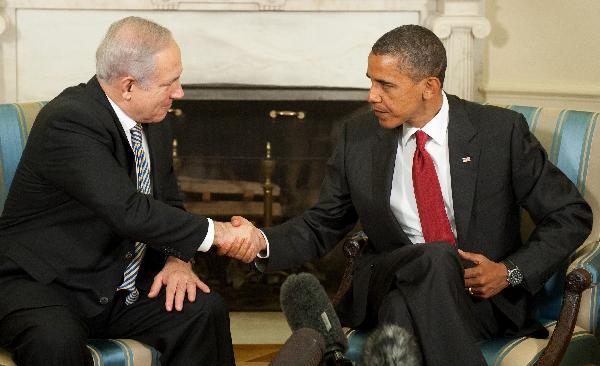Obama, Netanyahu meet over mending relations
In a clear move for mending relations, U.S. President Barack Obama on Tuesday reaffirmed U.S. commitment on Israel's security by vowing to mount pressure on Iran, Israeli Prime Minster Benjamin Netanyahu, in turn, convinced Obama that his government would "take risk" for peace with the Palestinians.
 |
|
U.S. President Barack Obama(R) meets Israeli Prime Minister Benjamin Netanyahu(L) in the White House on July 6, 2010.[Xinhua/AFP] |
"The bond between the United States and Israel is unshakable. It encompasses our national security interests, our strategic interests, but most importantly, the bond of two democracies who share a common set of values and whose people have grown closer and closer as time goes on," Obama told reporters after his meeting with Netanyahu in the White House.
As Israel's deep concern over Terhan's nuclear threat, Obama convinced the prime minister that the United States would continue to "put pressure on Iran to meet its international obligations and to cease the kinds of provocative behavior that has made it a threat to its neighbors and the international community."
After pushing UN Security Council to pass a resolution on Iran' s nuclear program, President Obama early this month has signed a Congress bill on expanding unilateral sanctions against Iran, as an extra effort to prevent Tehran from developing nuclear weapons.
The Obama-Netanyahu meeting was widely viewed as an important opportunity for the two allies to mend their relations, which has been in tensions since the two leaders took offices last year over disputes on peace in the Middle East and Iran's nuclear program.
President Obama wants the Netanyahu-led government to completely freeze Jewish settlement activities in the West Bank and East Jerusalem for resuming direct talks with the Palestinian National Authority (PNA), while Netanyahu urges the president to top curbing Iran's nuclear program at the priority of U.S. policy toward the Middle East.
The disputes obviously have deepened mistrust between the two leaders, and have overshadowed Netanyahu's last three visits to Washington. However, following a set of tough measures against Iran were taken by Washington, experts say that it's Netanyahu's turn to show his goodwill to President Obama.
At the joint press conference with Netanyahu, Obama said he hopes the direct peace talks between Israel and the Palestinians could be held in September, saying that the Netanyahu-led government has prepared to take risk for peace.
Echoing Obama, the Israeli prime minister, who was warmly greeted by the White House this time, said that Israel believes peace is the best option for itself and the Palestinians and would change the entire Middle East.
"I think it's high time to begin direct talks. I think with the help of President Obama, (Palestinian) President (Mahmoud) Abbas and myself should engage in direct talks to reach a political settlement of peace, coupled with security and prosperity," said Netanyahu.
Under the pressure mounted by the Obama administration, the Israeli government and the PNA resumed their talks in May, although in an indirect way mediated by U.S. special envoy George Mitchell, ending a 17-month-long stalemate.
Obama has urged both sides to resume direct talks in order to reach a permanent agreement that leads to the establishment of an independent Palestinian state. But the two sides refused the call because of dispute over Jewish settlement expansion in the West Bank and East Jerusalem.
The Palestinian side insists that the talks shall not resume until the Israeli government totally freezes the Jewish settlement construction in the West Bank, while the Israeli side blames PNA of setting condition for resuming the talks and vows to ensure the "natural growth" of the Jewish settlements.
At least 450,000 Israelis live in more than 100 settlements in the West Bank and East Jerusalem.
 0
0 







Go to Forum >>0 Comments